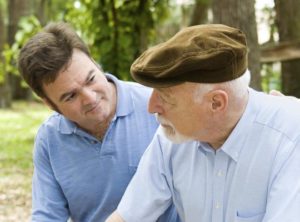
By John M. de Castro, Ph.D.
“Mindfulness Self-Compassion turns the usual self-critical paradigm around and asks the care partner, in the midst of a difficult caregiving moment; become aware of the emotions that arise in the moment and where they reside in your body (Mindfulness), recognize that there are others who suffer in this way (Common Humanity), and then offer yourself what you need in the moment (Self-Kindness). Again, this is not to change the moment of suffering for the person you are caring for or for yourself, but because you are suffering too! In the end this supports both of you in a softer way and provides the circumstances, not necessarily for ‘cure’ but for healing.” – Sarel Rowe
Stress is epidemic in the western workplace with almost two thirds of workers reporting high levels of stress at work. In high stress occupations burnout is all too prevalent. This is the fatigue, cynicism, and professional inefficacy that comes with work-related stress. Burnout is associated with depression-like symptoms and often post-traumatic stress disorder (PTSD)-like symptoms. Healthcare is a high stress occupation. It is estimated that over 45% of healthcare workers experience burnout.
Providing care for the dying can be can be a very satisfying, rewarding, and even joyful experience. But, over time, caregiving can wear the caregiver out and can lead to burnout. Indeed, 62% of physicians involved with end of life care report symptoms of burnout. This is magnified many times when the patient is a child. This is supposed to be the beginning of life, not its end. It is often the case that caregivers for the dying become personally attached to their patient. With a child, that attachment becomes deep and profoundly emotional. This level of emotional stress is difficult to repeatedly endure. So, there is a need to find ways to help the healthcare professionals who provide care in general, but particularly for those working with children to cope with the stress and emotional drain.
It has recently been demonstrated that mindfulness training can help caregivers cope with the stress. It has also been shown to help to prevent burnout in multiple occupations and particularly in healthcare workers. So, it would make sense to investigate the effectiveness of mindfulness training in preventing burnout in healthcare workers providing end of life care to children. In today’s Research News article “Multimodal Mindfulness Training to Address Mental Health Symptoms in Providers Who Care for and Interact with Children in Relation to End-of-Life Care.” See:
or see summary below. O’Mahoney and colleagues recruited palliative care and other health-care professionals who were involved in caring for terminally ill children. They received a 9-week mindfulness training program meeting once a week for 2 hours in the evening. They were measured before and after training for experiential avoidance, cognitive fusion (taking thoughts as true and upsetting), depression, burnout, and PTSD symptoms.
They found that the mindfulness training resulted in significant decreases in depression and post-traumatic stress disorder (PTSD) symptoms. These are interesting preliminary results. But, there is a need to follow this up with a randomized controlled trial to determine unequivocally if the training was responsible for the improvements. The effects do seem reasonable as mindfulness training has been shown in different contexts to reduce depression and improve PTSD symptoms. These findings simply extend these general understandings of the effects of mindfulness training to end of life care for children. But, again demonstrate the usefulness of mindfulness training to relieve the psychological effects of caregiving.
So, reduce depression and PTSD symptoms in caregivers for dying children with mindfulness.
CMCS – Center for Mindfulness and Contemplative Studies
“We are set up for short-term stress, but caregiving is long-term stress. Mindfulness works to inhibit the stress response. Most of us run around listening to our thoughts, and this is particularly true of caregivers, who are driven by the To-Do list. They are never at rest.” – Griffiths Vega
This and other Contemplative Studies posts are also available on Google+ https://plus.google.com/106784388191201299496/posts
Study Summary
O’Mahony S, Gerhart J, Abrams I, Greene M, McFadden R, Tamizuddin S, Levy MM. A Multimodal Mindfulness Training to Address Mental Health Symptoms in Providers Who Care for and Interact With Children in Relation to End-of-Life Care. Am J Hosp Palliat Care. 2016 Jul 21. pii: 1049909116660688. [Epub ahead of print]
Abstract
AIM: Medical providers may face unique emotional challenges when confronted with the suffering of chronically ill, dying, and bereaved children. This study assessed the preliminary outcomes of participation in a group-based multimodal mindfulness training pilot designed to reduce symptoms of burnout and mental health symptoms in providers who interact with children in the context of end-of-life care.
METHODS: A total of 13 medical providers who care for children facing life-threatening illness or bereaved children participated in a 9-session multimodal mindfulness session. Mental health symptoms and burnout were assessed prior to the program, at the program midpoint, and at the conclusion of the program.
RESULTS: Participation in the pilot was associated with significant reductions in depressive and posttraumatic stress disorder (PTSD) symptoms among providers (P < .05).
CONCLUSION: Mindfulness-based programs may help providers recognize and address symptoms of depression and PTSD. Additional research is needed to enhance access and uptake of programming among larger groups of participan








